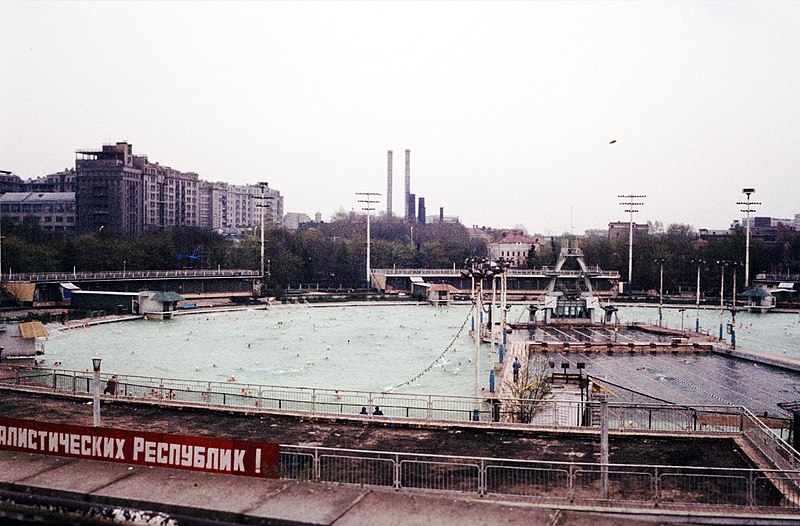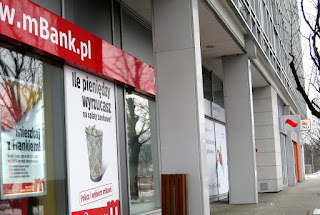 The Warsaw Palace of Culture & Science (seen here at dusk--so like 3pm) was a gift from Russia, and was originally named after Joseph Stalin. I've noticed many Poles have a generally antagonistic relationship with the building, calling it an eyesore and worse. I always found it rather beautiful myself.
The Warsaw Palace of Culture & Science (seen here at dusk--so like 3pm) was a gift from Russia, and was originally named after Joseph Stalin. I've noticed many Poles have a generally antagonistic relationship with the building, calling it an eyesore and worse. I always found it rather beautiful myself.Still the tallest building in Poland, it was erected during 1952-5, requiring 3500 workers (16 of whom died during the construction).
Here it is as a work in progress (with structural engineers poring over their calculations in the foreground):

The Russian Palaces of Culture were erected all over the Eastern Bloc, aimed at hosting various recreational activities valued by the socialists. The buildings contain cinemas, dance halls, sport facilities, lecture halls, and the like.
Today, the Palace is still in use--there is a cinema as well as a cafe/bar which I visit frequently.
The Soviets' encouragement of culture and science seems almost admirable, until you consider what "culture" would be like in the Soviet imagination. To give you an idea of the lengths Stalin went to to impose his views of acceptable and unacceptable leisure activities, consider the fate of The Temple (Cathedral) of Christ the Savior in Moscow.
Polish writer Ryszard Kapuściński provides an account, which you can find in Imperium, his account of the collapse of the Soviet Union during the 1930s-1990s.
The Temple of Christ was a magnificent structure erected by Nicholas I (and successors) between 1839 and 1881 to commemorate Russia's defeat of Napoleon in the Napoleonic wars. As Kapuściński reports, "Not only Moscow, not only Russia, but also the entire world watched the construction with astonishment and speechless admiration." Upon its consecration, those entering the interior "utter a cry of rapture and admiration." The Temple was 30 stories tall, its walls covered with marble and granite, and the cupola crowning the Temple was covered with bronze. The Temple could hold 10,000 worshippers. It was a magnificant structure and a prize of Russia.
Until 1931, when Stalin razed it in order to build his Palace of the Soviets upon the exact site. Kapuściński explains why this temple was selected for destruction when alternative sites were available:
Only he who maintains (and has somehow proven) that his authority has a human an divine nature can rule here, can lead the people and count on their obedience and devotion...The hand of God is in the case the sole legitimation of power. The Bolsheviks attempt to fit into this tradition, to draw from its proven life-giving springs. To achieve this status [of God Himself], one must demolish the Houses of the former God (demolish them or strip them of their holiness, converting them into fuel dumps or furniture warehouses), and on their foundations raise new temples, new objects of admiraiton and worship--Houses of the Party, Palaces of the Soviets, Committees. In this transformation--or, more precisely, in this revolution--one effects a simple but radical exchange of symbols.This exchange of symbols turned this:
 into this:
into this:
And, since Stalin was too busy murdering people (he killed 10 million people by starvation in the Ukraine in the 1930s, then set about annexing Poland, Lithuania, Latvia, and Estonia, followed of course by the Second World War, the aftermath of which required mass deportation of various populations to Siberia and Kazakhstan--he was a busy man), his grand plans for the Palace of the Soviets never were completed. The site fell into disrepair, and Khruschev later converted it to a large public swimming pool:

This woeful tale ends somewhat happily, as the Temple was reconstructed in the 1990s, after the collapse of the Soviet Union:

Ultimately, I must concede that while I enjoy a good mulled wine at the Warsaw Palace of Culture's Cafe Kulturalna, I understand Poles' mixed feelings about the structure--a clear symbol of Soviet power and all that comes along with it.






